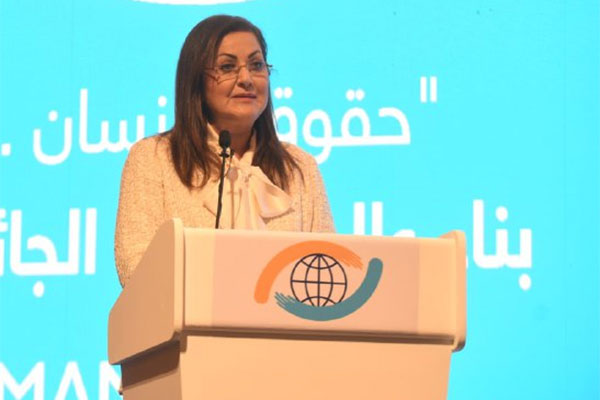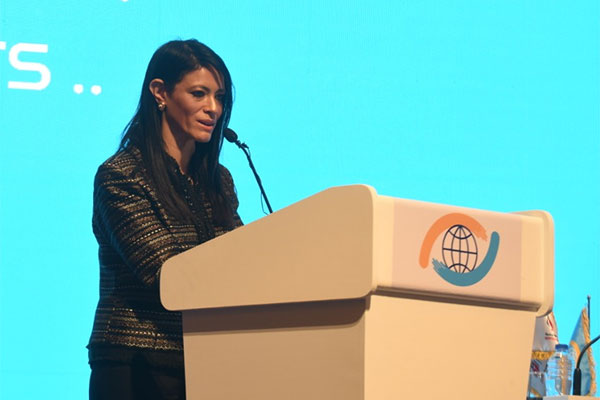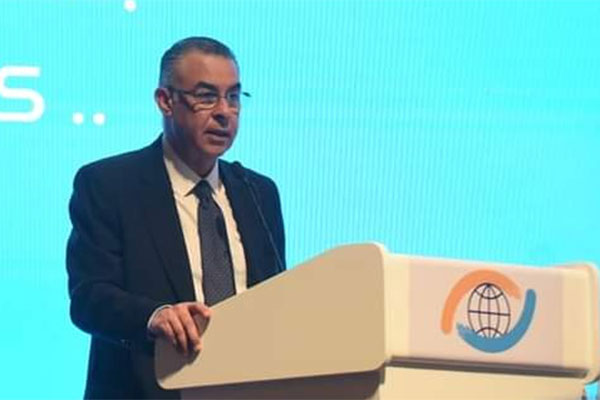The Egyptian Center for Strategic Studies (ECSS) launched on Thursday a conference titled ‘Human Rights: Building the Post Pandemic World’ that aims to tackle the repercussions of the coronavirus pandemic.
The conference discusses the 2020-2021 International Agenda on Human Rights, with a thematic focus on the COVID-19 pandemic and the need to build back better by ensuring human rights are central to recovery efforts.
The conference was opened by Dr. Khaled Okasha, the general manager of the ECSS.
“The greatest interest in the conference came from the Egyptian state, and all sectors of society, with the announcement of holding a broad inclusive dialogue on human rights in a post-COVID world,” said Okasha.
"We aim to envision such a world through discussing the International Agenda on Human Rights, released by the United Nations last December, which identified ending discrimination and racism, addressing inequalities, promoting participation and solidarity, and supporting sustainable development as fundamental rights and an indispensable framework for building a post-pandemic world," the ECSS general manager added.
“We would like to take this opportunity to express our grateful thanks to the honourable ministers, in the following order of participation: Hala El-Said, the minister of planning and economic development; Rania Al-Mashat, the minister of international cooperation; Hala Zayed, minister of health and population; Tarek Shawki, the minister of education and technical education; and Nevine El-Qabbaj, the minister of social solidarity,” Okasha mentioned in his opening statement.
The honourable ministers have shown a sincere desire to share their vision and ideas on the conference’s topics, contributing to enriching discussions, Okasha added.
He extended his sincere thanks to members of the legislature, both senators and representatives, for their participation and their contribution as to the legislative and legal frameworks that would help create a climate that promotes building a better world with human rights at its core.
“The ECSS would also like to give thanks to specialised national councils, particularly the National Council for Human Rights and the National Council for Women, for their participation and their intellectual and practical views on the issue,” he added.
Okasha expressed his special thanks and appreciation to foreign ambassadors to Egypt, who were keen to join the conference.
“In particular, we wish to thank the embassy of the United States of America and the embassies of European countries, the strategic partners of the Egyptian state, embassies of Asian countries, that have extended historical and cultural relations with Egypt, embassies of sister Arab countries, and finally embassies of African countries, that are a strategic and historical extension of Egypt,” Okasha specified.
He also extended his thanks to the international organisations participating in the conference and their representatives in Cairo for their willingness to engage in the panel’s discussions and provide us with their vision of the human rights situation amid the pandemic and ways of promoting human rights, ensuring welfare and a decent life for citizens in a world that respects their humanity.
“The ECSS especially extends its thanks to the International Committee of the Red Cross and the International Organisation for Migration for being strategic partners and sponsors of the conference and the fruitful discussions it will bring,” he added.
Opening session contributions
“We are proud that the country is working [on human rights] as part of the agenda of Egypt Vision 2030; we are one of the very first countries in the world to follow the sustainable developments goals,” said Hala El-Said, the minister of planning and economic development, in her remarks during the opening session.
Rania Al-Mashat, the minister of international cooperation, said her ministry aims to develop new terminology to forge a link between diplomacy and economy.
“We had to form a new concept at the Ministry of International Cooperation that explains our vision, which is economic diplomacy,” said Al-Mashat.
She stressed the need to achieve the international goals of sustainable development in order to benefit humanity, such as food security and combating climate change.
Meanwhile, Ambassador Alaa Roushdy, the assistant to the minister of foreign affairs, said that “launching Egypt's Supreme Standing Committee for Human Rights reflects a paradigm shift in Egypt’s vision on how to deal with the human rights’ file."
First session: ‘Human Rights Amid the Pandemic.’
Minister of Health and Population Hala Zayed said that the country is working on providing a decent post-pandemic life. She mentioned the efforts and initiatives that the health ministry and all the entities in the country are providing for the public, according to the country’s sustainable development vision.
The minister demonstrated several initiatives such as the extensive campaign for the early detection and treatment of virus C, treating diabetes and obesity, and the presidential initiative to eliminate waiting lists for critical surgeries.
“These initiatives are the reason why we successfully responded to the coronavirus in Egypt, as they alleviated the severity of the crisis in healthcare institutions,” Zayed said.
The head of the International Committee of the Red Cross (ICRC) in Cairo pointed out Egypt’s efforts in fighting the coronavirus.
“We extend our appreciation to the Ministry of Health and the National Council for Women for their great efforts combating the COVID-19 pandemic,” said Mr Jerome Fontana.
He said that Egypt is different, rebellious and discrete, as it’s incomparable to other countries in its way confronting the virus.
“Egyptian authorities demonstrated remarkable strength and determination in beating the COVID-19 pandemic,” Mr Fontana said.
ICRC head in Cairo mentioned that the pandemic and its worldwide consequences is not coming to an end currently, and he emphasized that unless everyone is vaccinated, we can’t be safe.
“There must be an equitable distribution of the coronavirus vaccine, and the minorities should have access to it.” he assured.

The minister of planning and economic development Hala El-Said.

The minister of international cooperation Rania Al-Mashat.

Ambassador and the assistant to the minister of foreign affairs Alaa Roushdy.
Short link: